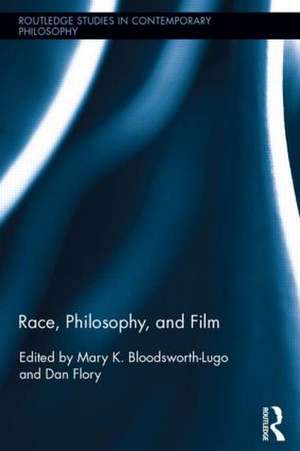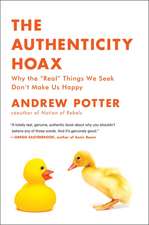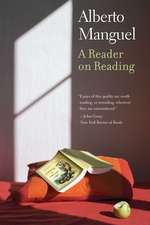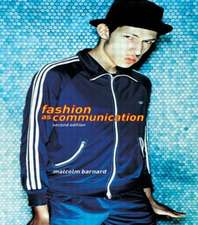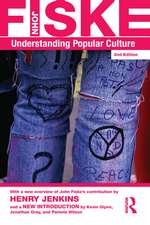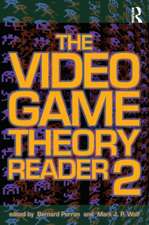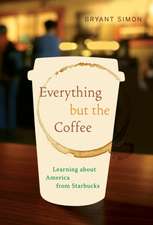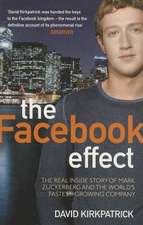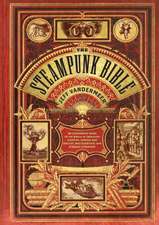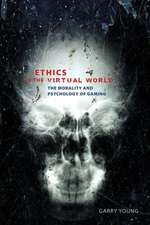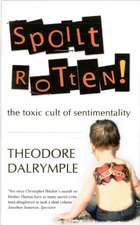Race, Philosophy, and Film: Routledge Studies in Contemporary Philosophy
Editat de Mary K. Bloodsworth-Lugo, Dan Floryen Limba Engleză Paperback – 21 mai 2015
The collection’s contributors anchor their discussions of race through considerations of specific films and television series, which serve as illustrative examples from which the essays’ theorizations are drawn. Inclusive and current in its selection of films and genres, the collection incorporates dramas, comedies, horror, and science fiction films (among other genres) into its discussions, as well as recent and popular titles of interest, such as Twilight, Avatar, Machete, True Blood, and The Matrix and The Help. The essays compel readers to think more deeply about the films they have seen and their experiences of these narratives.
| Toate formatele și edițiile | Preț | Express |
|---|---|---|
| Paperback (1) | 445.56 lei 43-57 zile | |
| Taylor & Francis – 21 mai 2015 | 445.56 lei 43-57 zile | |
| Hardback (1) | 897.16 lei 43-57 zile | |
| Taylor & Francis – 22 mar 2013 | 897.16 lei 43-57 zile |
Din seria Routledge Studies in Contemporary Philosophy
-
 Preț: 311.41 lei
Preț: 311.41 lei -
 Preț: 309.90 lei
Preț: 309.90 lei -
 Preț: 311.22 lei
Preț: 311.22 lei -
 Preț: 296.44 lei
Preț: 296.44 lei -
 Preț: 310.88 lei
Preț: 310.88 lei - 9%
 Preț: 905.34 lei
Preț: 905.34 lei - 8%
 Preț: 385.19 lei
Preț: 385.19 lei - 9%
 Preț: 935.00 lei
Preț: 935.00 lei -
 Preț: 312.90 lei
Preț: 312.90 lei -
 Preț: 313.34 lei
Preț: 313.34 lei -
 Preț: 310.16 lei
Preț: 310.16 lei -
 Preț: 307.69 lei
Preț: 307.69 lei - 9%
 Preț: 937.68 lei
Preț: 937.68 lei -
 Preț: 311.41 lei
Preț: 311.41 lei -
 Preț: 310.84 lei
Preț: 310.84 lei -
 Preț: 311.41 lei
Preț: 311.41 lei -
 Preț: 373.47 lei
Preț: 373.47 lei - 9%
 Preț: 934.94 lei
Preț: 934.94 lei - 9%
 Preț: 1038.15 lei
Preț: 1038.15 lei - 18%
 Preț: 1114.98 lei
Preț: 1114.98 lei - 18%
 Preț: 1112.21 lei
Preț: 1112.21 lei - 18%
 Preț: 1058.43 lei
Preț: 1058.43 lei - 18%
 Preț: 1056.00 lei
Preț: 1056.00 lei -
 Preț: 387.16 lei
Preț: 387.16 lei - 18%
 Preț: 1120.20 lei
Preț: 1120.20 lei - 18%
 Preț: 1061.93 lei
Preț: 1061.93 lei - 18%
 Preț: 1117.77 lei
Preț: 1117.77 lei - 18%
 Preț: 1061.22 lei
Preț: 1061.22 lei - 18%
 Preț: 1108.73 lei
Preț: 1108.73 lei - 18%
 Preț: 1111.55 lei
Preț: 1111.55 lei - 18%
 Preț: 1051.90 lei
Preț: 1051.90 lei - 18%
 Preț: 1109.78 lei
Preț: 1109.78 lei - 18%
 Preț: 1110.11 lei
Preț: 1110.11 lei - 18%
 Preț: 1052.35 lei
Preț: 1052.35 lei - 18%
 Preț: 1055.32 lei
Preț: 1055.32 lei -
 Preț: 481.58 lei
Preț: 481.58 lei - 18%
 Preț: 1111.87 lei
Preț: 1111.87 lei - 18%
 Preț: 1119.87 lei
Preț: 1119.87 lei - 18%
 Preț: 1115.69 lei
Preț: 1115.69 lei - 18%
 Preț: 1061.57 lei
Preț: 1061.57 lei - 18%
 Preț: 1057.40 lei
Preț: 1057.40 lei - 18%
 Preț: 1117.43 lei
Preț: 1117.43 lei - 18%
 Preț: 1059.84 lei
Preț: 1059.84 lei - 18%
 Preț: 1062.98 lei
Preț: 1062.98 lei - 18%
 Preț: 1064.70 lei
Preț: 1064.70 lei - 18%
 Preț: 1221.12 lei
Preț: 1221.12 lei - 18%
 Preț: 1111.16 lei
Preț: 1111.16 lei - 18%
 Preț: 1119.16 lei
Preț: 1119.16 lei - 18%
 Preț: 1060.25 lei
Preț: 1060.25 lei - 18%
 Preț: 897.16 lei
Preț: 897.16 lei
Preț: 445.56 lei
Nou
Puncte Express: 668
Preț estimativ în valută:
85.27€ • 88.48$ • 71.27£
85.27€ • 88.48$ • 71.27£
Carte tipărită la comandă
Livrare economică 17-31 martie
Preluare comenzi: 021 569.72.76
Specificații
ISBN-13: 9781138921900
ISBN-10: 1138921904
Pagini: 250
Ilustrații: 8 black & white halftones
Dimensiuni: 152 x 229 x 15 mm
Greutate: 0.36 kg
Ediția:1
Editura: Taylor & Francis
Colecția Routledge
Seria Routledge Studies in Contemporary Philosophy
Locul publicării:Oxford, United Kingdom
ISBN-10: 1138921904
Pagini: 250
Ilustrații: 8 black & white halftones
Dimensiuni: 152 x 229 x 15 mm
Greutate: 0.36 kg
Ediția:1
Editura: Taylor & Francis
Colecția Routledge
Seria Routledge Studies in Contemporary Philosophy
Locul publicării:Oxford, United Kingdom
Public țintă
Postgraduate and UndergraduateCuprins
Introduction: Philosophical Approaches to Race in Film Dan Flory and Mary K. Bloodsworth-Lugo Epistemology 1. Imaginative Resistance and the White Gaze in Machete and The Help Dan Flory 2. Born into Bondage: Teaching The Matrix and Unlearning the Racial Organization of Knowledge Michael Eng 3. What's So Bad About Blackface? Christy Mag Uidhir Aesthetics 4. So Now You’re Swedish American?’: Jewish-American Women, Philosophies of Beauty in Requiem for a Dream Renée R. Curry and William Brigham 5.Cruising Through Race Monique Roelofs Moral Philosophy 6. True Blood and Race: From Progress to Complacency to Paganism, to Humanity Naomi Zack 7. Avatar: Racism and Prejudice on Pandora Michael P. Levine and Damian Cox 8. "Now, Imagine She's White": The Gift of the Black Gaze and the Re-Inscription of Whiteness as Normative in A Time to Kill George Yancy Social and Political Philosophy 9. Race As/And (Ex)change: Trading Places and the Rise of Neo-Liberalism Charles W. Mills 10. Hardly Black and White: Racial and Sexual Stereotypes in Manderlay and Black Snake Moan Mélanie Walton 11. Elisions of Race and Stories of Progress: Planet 51 and The Princess and the Frog Mary K. Bloodsworth-Lugo and Carmen R. Lugo-Lugo Technology and the (Lived) Body 12.Vampires, Technology, and Racism: The Vampiric Image in Twilight and Let Me In Brian H. Onishi 13. Desperate Black Female: Sex and Race in Monster’s Ball Lucy Bolton
Notă biografică
Mary K. Bloodsworth-Lugo is Professor of Critical Culture, Gender, and Race Studies at Washington State University, USA.
Dan Flory is Associate Professor of Philosophy at Montana State University, USA.
Dan Flory is Associate Professor of Philosophy at Montana State University, USA.
Descriere
The collection’s contributors anchor their discussions of race through considerations of specific films and television series, which serve as illustrative examples from which the essays’ theorizations are drawn. Inclusive and current in its selection of films and genres, the collection incorporates dramas, comedies, horror, and science fiction films (among other genres) into its discussions, as well as recent and popular titles of interest, such as Twilight, Avatar, Machete, True Blood, The Matrix and The Help. The essays compel readers to think more deeply about the films they have seen and their experiences of these narratives.
